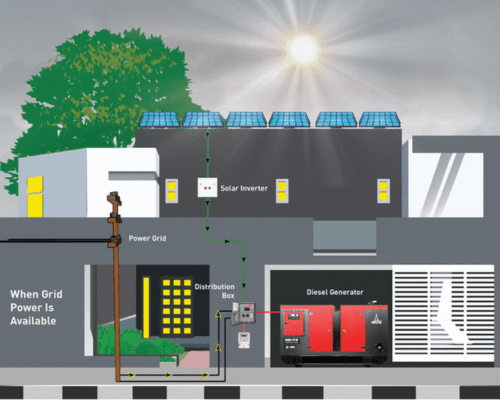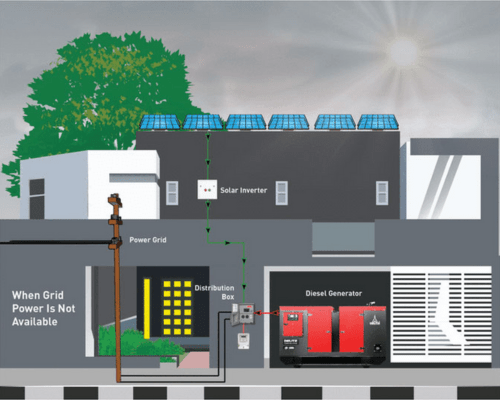Rooftop Solar
How does solar work?


When the sun’s rays fall on a solar panel installed on the roof of a home, commercial building or industry, several cells in the module help convert the sunlight into direct current. However, since most devices in our home work with alternating current, the module is connected to an inverter that performs this conversion. Once the conversion is complete, the inverter’s output is alternating current that connects to your home’s electrical grid to provide you with solar energy.
It is important to know that you can use the electricity on your roof via the electricity network with the electricity you receive from your DISCOM. These types of arrangements are common and something solar installers are good at. However, if you want to choose a battery-powered system that will help you benefit from the sun at night, you should choose a hybrid or off-grid system. What exactly? This brings us to the next section, the different types of solar panels you can choose from:
Types of solar systems:
A grid-tied system, or grid-tied system, is a solar energy system that is directly connected to a building’s electrical grid. These systems prioritize solar power supply and will only use grid power when energy production is lower than demand. Inverters, as explained above, are used to convert DC-generated electricity to AC. When you choose a grid-tied system, you are eligible for Net Metering, a process where all excess power you generate is fed into the grid and you receive a single credit. If you generate more than you consume in a year, EDAS will also pay you for the excess amount generated. Net Metering is required to receive solar subsidies in many states.
Off grid solar systems differ from grid systems in that they are installed independently of the state grid. These systems include an additional battery system charged with solar energy. Batteries are charged when the power produced is more than the power consumed. While a battery-powered system may seem like a good idea on paper, the system is often more expensive and less efficient than a networked system. The batteries need to be replaced about every five years, but the upside is that you can use solar power even during off-generation hours. Off grid systems are perfect for rooftop solar when you have little or no electricity.
Off grid solar systems differ from grid systems in that they are installed independently of the state grid. These systems include an additional battery system charged with solar energy. Batteries are charged when the power produced is more than the power consumed. While a battery-powered system may seem like a good idea on paper, the system is often more expensive and less efficient than a networked system. The batteries need to be replaced about every five years, but the upside is that you can use solar power even during off-generation hours. Off grid systems are perfect for rooftop solar when you have little or no electricity.
Can I install rooftop solar?
The short answer to the question is: As long as you have a roof, no one can stop you from installing solar panels. Even if you live in a high-rise building, you should check with your RWA because today’s society tends to share roofs if there is a plan. However, there are some obvious points to consider before you decide to install a solar roof on your home:
Space: The first thing you need to check is whether you have free space for solar panel installation. Additionally, for the system to meet your needs, the space must be large enough to accommodate the necessary shelves.
Applications: Solar radiation is beneficial for most residential, industrial and commercial applications. Solar power is generally better because of the savings you make on your electric bill. Let’s try to explain this with an example. We used the GeoSolar Basic Calculator for two people living in South New Delhi. One’s electricity bill is Rs 1,000 and the other’s is Rs 10,000. We found that a customer whose bill was for 1000 saved $153, while a resident who paid 10,000 saved $2162, a profit of over 27%. It is also worth noting that smaller systems are harder to find and do not bring as much profit.
Policies: Many states in India have their own solar energy policies. If you’re not sure or haven’t read anything about your situation yet, you can read it here. Many states have adopted Net Metering laws and offer highly profitable programs to build on top of solar PV installation. Make sure you are familiar with the policies in your country and keep up to date.
Net Metering: Like solar policies, net metering policies vary by state. Some DISCOMs process requests quickly, while others process them slowly. It’s not a bad idea to talk to your DISCOM or solar installer about net metering before you decide to go solar. You can also contact our expert solar consultants by clicking here.
Approvals: Installation of a solar PV system may require approval or NOC from your DISCOM depending on the type and size of the solar system. Some states, including Delhi, also have a simple admission process. There is no doubt that in such a situation, installing solar panels on the roof is the fastest way. If you live in a housing community, you may need approval from your RWA. So check this carefully.
Sun protection: If your roof is heavily covered with nearby objects, it may not be the best place to install solar panels. If you have a large roof over your home there are other options the Engineering and Design team can offer but there is no one size fits all solution. That’s why you should follow the shadow closely. Geo Solar specializes in providing shadow analysis tools and location assessment services.
With the GeoSolar Advanced Rooftop Solar Energy Calculator, you can calculate almost all of the above factors in one place and easily find your solar energy potential. Not only that, the Advanced Calculator also allows you to understand and use the different financing options available and decide whether you want to purchase solar panels and all their components or just solar energy.
How can Geo Solar help you to install rooftop solar?
Geo Solar is a leading internet solar company that uses technology, data and analytics to deliver customized and practical solar energy solutions to residential, commercial and industrial energy users. It aims to change the way solar energy is perceived, bought and sold in the country today. From the decision-making stage to the moment your installation switches to solar PV, Geo Solar promises to help and guide you for over 25 years.
We help you:
- Assess your solar potential using our advanced yet easy-to-use tools.
- Compare quotes from our previous quotes to ensure you always get the best and most competitive prices on the market.
- Buy solar panels by choosing the most suitable conditions for you and offering economical options and reliable payment methods.
Our aim is to:
- Simplify solar for you
- Provide you with competitive pricing
- Ensure you only deal with us and our pre-screened installers
- Make buying solar simple and easy
- Present Easy Financing options and help you get easy to service loans
- Ensure high standards of quality are maintained
- Give you a lifetime of support.
How much will my solar rooftop system cost?
The cost of a rooftop solar PV system depends on many factors other than the type and size of the system. Therefore, both can have a significant impact on the final cost of the system. Below are indicative prices for various system sizes. Note that these are indicative prices only and may vary depending on location, shade, roof location, type of construction, etc. in your location. Please note that prices may vary depending on difficulty level, depending on various factors such as:
The figures you see below are based on a detailed study showing measurements taken by the GeoSolar team for a standard height phase 1 system mounted on the roof, ensuring a good and efficient design. You can always use GeoSolar’s solar panel to find out the real cost of solar energy for your home.
| Grid-Connected Rooftop Solar System Size (kWp) | System Cost (Rs k) per kWp (Exclusive of taxes) ‘k’ stands for thouand |
|---|---|
| =1 | 73.9k |
| 1 to =2 | 57.8k |
| 2 to =4 | 55.5k |
| 4 to =5 | 52.0k |
| 5 to =7 | 50.6k |
| 7 to =10 | 49.6k |
| 10 to =15 | 43.7k |
| 15 to =20 | 41.8k |
| 20 to =30 | 40.8k |
| 30 to =50 | 38.0k |
| 50 to =70 | 37.0k |
| 70 to =90 | 36.0k |
| 90 to =100 | 35.0k |
| 100 to =250 | 34.5k |
| 250 | 33.5k |
